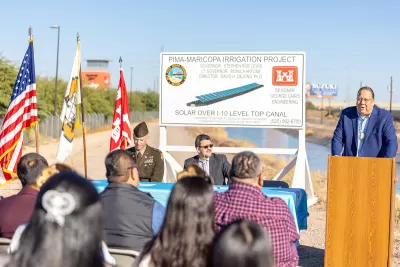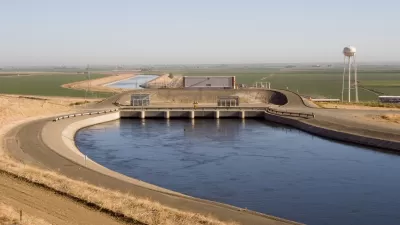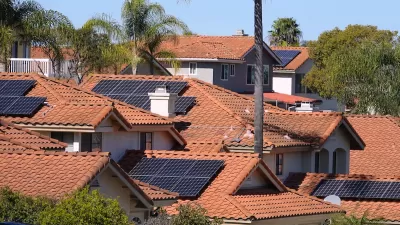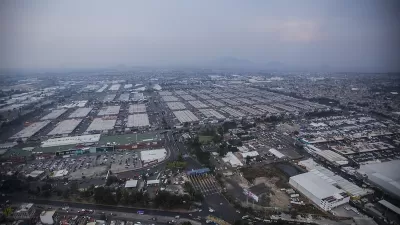Covering an irrigation canal with solar panels doubles its utility, producing renewable energy while protecting canal infrastructure and reducing water evaporation.

The Gila River Indian Community in Arizona activated the first solar-over-canal renewable energy project in the country, reports Shondiin Silversmith in the Arizona Mirror. It is the first phase in the Pima-Maricopa Irrigation Project Renewable Energy Pilot Project.
“The project spans over 2,700 linear feet of the Casa Blanca Canal, which is located along Interstate 10 near Sacaton” and, according to the tribe, “represents a groundbreaking solution to the intertwined crises of energy, water and climate change, specifically addressing the unique needs of the Gila River Indian Community, the State of Arizona, the southwest region and the Colorado River Basin.”
The project reduces water evaporation and maintenance requirements for the canal while producing energy and helping the tribe move toward a carbon-neutral energy footprint. The tribe is planning to expand the project to more portions of the local irrigation system.
FULL STORY: Gila River Indian Community turns on power for first ever solar-over-canal project

Trump Administration Could Effectively End Housing Voucher Program
Federal officials are eyeing major cuts to the Section 8 program that helps millions of low-income households pay rent.

Planetizen Federal Action Tracker
A weekly monitor of how Trump’s orders and actions are impacting planners and planning in America.

Ken Jennings Launches Transit Web Series
The Jeopardy champ wants you to ride public transit.

Rebuilding Smarter: How LA County Is Guiding Fire-Ravaged Communities Toward Resilience
Los Angeles County is leading a coordinated effort to help fire-impacted communities rebuild with resilience by providing recovery resources, promoting fire-wise design, and aligning reconstruction with broader sustainability and climate goals.

When Borders Blur: Regional Collaboration in Action
As regional challenges outgrow city boundaries, “When Borders Blur” explores how cross-jurisdictional collaboration can drive smarter, more resilient urban planning, sharing real-world lessons from thriving partnerships across North America.

Philadelphia Is Expanding its Network of Roundabouts
Roundabouts are widely shown to decrease traffic speed, reduce congestion, and improve efficiency.
Urban Design for Planners 1: Software Tools
This six-course series explores essential urban design concepts using open source software and equips planners with the tools they need to participate fully in the urban design process.
Planning for Universal Design
Learn the tools for implementing Universal Design in planning regulations.
Ada County Highway District
Clanton & Associates, Inc.
Jessamine County Fiscal Court
Institute for Housing and Urban Development Studies (IHS)
City of Grandview
Harvard GSD Executive Education
Toledo-Lucas County Plan Commissions
Salt Lake City
NYU Wagner Graduate School of Public Service





























